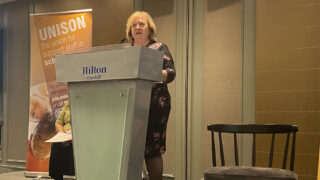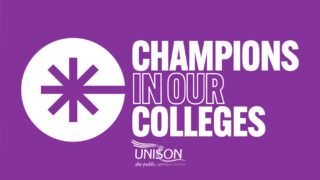Pupils are missing out on essential support as teaching assistants increasingly provide cover for absent teachers, without lesson plans or help from other colleagues, according to a report released by UNISON today (Saturday).
The report Teaching on the Cheap? is based on survey responses from almost 6,000 teaching assistants covering classes in England and Wales. It suggests ongoing teacher shortages mean support staff are increasingly having to lead lessons and manage whole classes by themselves.
The research finds 45% say they are covering more classes now than they were the previous school year (2022/2023).
The report, commissioned by UNISON and written by researcher Rob Webster, found three quarters of survey respondents (75%) say looking after an entire class means they end up teaching rather than supervising pupils.
This is despite national guidance stating school support staff should not ‘actively teach’ any classes they cover, says the research. This will also come as a surprise to many parents, says UNISON, who will assume their children are being taught in the classroom by teachers.
UNISON says too many low-paid teaching assistants end up performing roles for which they are neither trained nor paid. This results in pupils being taught on the cheap, as three quarters (75%) of support staff say they receive no additional money for stepping up.
According to the findings, almost two in five (39%) report covering classes for at least five hours per week. That, says the research, is equivalent to roughly one school day a week, or half a term’s cover over a school year. Additionally, another 15% say they lead full classes for at least 11 hours a week.
Half (51%) of the teaching assistants in both secondary and special schools have been deployed to cover classes because their schools don’t have enough teachers. In primary schools, this was the case for almost a quarter (24%) of support staff.
But providing cover for teaching colleagues means teaching assistants’ normal tasks are not being done. Three quarters (74%) say this is the case and leaves the pupils they support without any assistance.
In primary schools, almost half the teaching assistants (49%) say they rarely or never have support to help them cover classes, even though teachers would usually have an assistant on hand in the classroom.
And only half (51%) of the support staff who cover classes are provided with lesson plans. Eight in ten (81%) teaching assistants believe their deployment to cover classes is having a negative impact on the quality of special educational needs provision in their schools.
Six in ten (63%) of those based in primary schools say pupils are missing out on critical catch-up sessions, as well as on literacy and numeracy support.
Assistants describe regularly being told to lead classes ranging from nursery to year 6, with just minutes to spare.
Those working in secondary schools report planning and teaching subjects at GCSE level where teachers have left and not been replaced. Many feel they are used as cheap substitutes for teachers and are unable to give pupils the quality lessons they need.
Adding such intense duties and responsibilities to their workloads is pushing many to think about leaving education for jobs elsewhere, warns UNISON.
The union is calling for a review of the role of teaching assistants as they’re now providing cover in circumstances way beyond what has been nationally agreed. Their skills must also be better recognised and their pay negotiated by a new, independent body, it adds.
UNISON head of education Mike Short said: “The strain imposed on teaching assistants is both unacceptable and exploitative. When they’re leading full classes, teaching assistants are being diverted from what they do best and pupils who need additional support are missing out.
“Schools’ budgets are so tight that, instead of getting in supply teachers to cover classes, heads are having to use teaching assistants on the cheap. Ministers are entirely responsible for the funding crisis that’s putting schools in this impossible position.
“Many children can’t grasp the basics without the critical assistance of teaching assistants. Redeploying them to other roles is unfair on everyone. Parents will rightly assume their children are being taught by teachers, not teaching assistants.
“The government must ensure all schools have the budget and staff to provide the education they’re meant to deliver. This over-reliance on unsatisfactory stopgap measures and overburdening teaching assistants in this way has to stop.”
Researcher and expert on teaching assistants Rob Webster said: “This study reveals the hidden costs of deploying teaching assistants to plug gaps in the teacher workforce.
“It disrupts support for pupils who need it, and prevents teaching assistants from doing their essential work.
“The special educational needs system in England is already at breaking point. Parents of children with additional needs will wonder what effect this considerable loss of teaching assistant capacity is having on their child’s provision.
“The current situation is having a detrimental effect on teaching assistants’ workload and wellbeing too. Left unaddressed, it could exacerbate the existing recruitment and retention crisis facing schools.”
Notes to editors:
– Teaching on the Cheap? is based on the survey responses of 5,989 teaching assistants in England and Wales located in primary/infant (84%), secondary (5%) and special schools (11%). The survey was conducted online between January and February 2024.
– An executive summary of the findings is available here.
– Quotes from the report include:
“My role has become increasingly one of cover for absent teachers in my department. Last year about 50% of my time was spent doing this.” Secondary higher level teaching assistant
“It is an expectation. If a teacher is off and has provided work, the teaching assistants are expected to teach the lesson.” Special school support assistant
“I’m told I have to plan and deliver a lesson every Monday as our class teacher does not work on this day. I am given no time to plan lessons, nor am I confident in doing this as I’ve not been trained. But I was told it’s in my contract.” Special school teaching assistant
“I’m having to cover an average of 3 to 4.5 days a week on a regular basis. This is partly because of the lack of funds to employ the extra staff needed or a supply.” Primary/infant teaching assistant
“I have led reception class every afternoon since November. The head implied that another member of staff would be taken on, but they haven’t been.” Primary/infant teaching assistant
“My school has used agency teachers to fill vacancies. The agency teacher in my class left so I was asked to step up and teach my class until a new teacher can be recruited. I am teaching my class on a full-term basis for the foreseeable future.” Special school teaching assistant
“I have been given a teaching timetable. Some was to cover maternity leave, some to fill a gap where a teacher had left and no one had been recruited to fill the space.” Secondary cover supervisor
“My school cannot afford supply teachers, so more teaching assistants than ever before are having to step in for teaching colleagues.” Primary/infant teaching assistant
“Teaching assistants should not be used to cover teachers’ lessons. We are not qualified teachers and the students deserve a good quality education. This can’t happen if lessons are being covered by support staff.” Special school teaching assistant
“I don’t think parents have any idea about how much of their children’s education is being delivered by unqualified teaching assistants.” Primary/infant higher level teaching assistant
“I only get 20p per hour more than my basic teaching assistant pay for covering lessons. I receive a total of 74p extra for covering a whole afternoon. The additional payment for this morning is approximately £2.50 net. Supply staff would have been paid £150 for the same work.” Primary/infant teaching assistant
“A supply teacher would get sometimes in excess of £100 per day, whereas we get barely £1 an hour extra. For about 30 hours of cover a month, I earned about £40 more. It doesn’t seem fair.” Primary/infant teaching assistant
– UNISON is the UK’s largest union, with more than 1.3 million members providing public services in education, local government, the NHS, police service and energy. They are employed in the public, voluntary and private sectors.
Media contacts:
Fatima Ayad M: 07508 080383 E: f.ayad@unison.co.uk
Anthony Barnes M: 07834 864794 E: a.barnes@unison.co.uk




